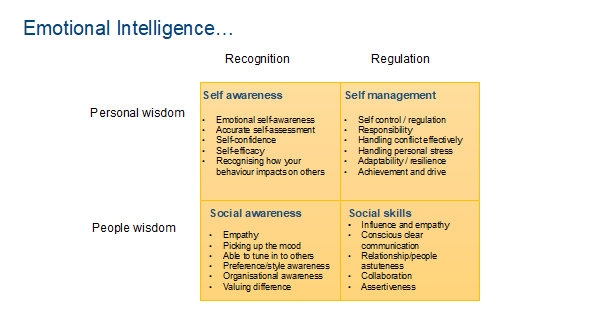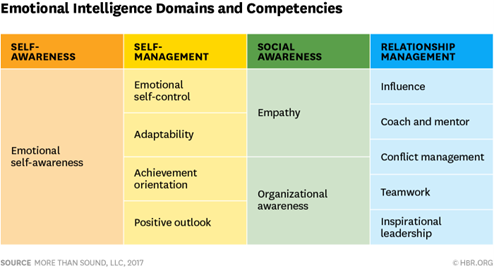Topic 2.2: Emotional Intelligence
Understanding, appreciating and respecting our own and others’ preferences for different ways of working, communicating and decision-making form a strong foundation for what is called “emotional intelligence” (EQ). Of course, personal change can be a challenging endeavour when it comes to rethinking patterns of behaviour we may have demonstrated for much of our life. This is why self-understanding and self-discovery is just the start of building emotional intelligence and social competence. To understand emotional intelligence a bit more deeply – and how to apply it – we need to look at the components that contribute to it. We will then take a look at how to develop and strengthen our emotional intelligence (a topic we’ll also take up in our workshops).
“Leadership researchers and experienced workers have long known that how well a person manages his or her emotions and those of others influences leadership effectiveness. For example, recognising anger in yourself and others, and being able to empathise with people, can help you be more effective at exerting influence … Emotional intelligence refers to qualities such as understanding one’s feelings, empathy for others, and the regulation of emotions to enhance living. This type of intelligence generally has to do with the ability to connect with people and understand their emotions…
“Based on global research, Daniel Goleman discovered that the most effective leaders are alike in one essential way: they all have a high degree of emotional intelligence. General intelligence (or IQ) and technical skills are considered threshold capabilities for success in executive positions. Yet, according to Goleman, without a high degree of emotional intelligence, a person can have excellent training, superior analytical skills, and loads of innovative suggestions, but he or she still will not make a great leader. His analysis also revealed that emotional intelligence played an increasingly important role in high-level management positions where difference in technical skills are of negligible importance. Furthermore, when star performers were compared to average ones in senior leadership positions, differences in emotional intelligence were more pronounced than differences in cognitive abilities” (Goleman 1998, Laabs 1999 in Dubrin, Dalglish and Miller, 2006: 35).[1]
In the summary above, you will have noted the name Daniel Goleman. While not the first to describe the theory of emotional intelligence, Goleman is certainly seen as a thought leader in how Emotional Intelligence plays out in our lives. His books include Emotional Intelligence (1995) and The New Leaders (2002). His emotional intelligence framework is summarised below.

Goleman and Boyatzis (2017) invite us to consider emotional intelligence in terms of our own practice – particularly in the context of leading (influencing) others.
“In the model of EI and leadership excellence that we have developed over 30 years of studying the strengths of outstanding leaders, we’ve found that having a well-balanced array of specific EI capabilities actually prepares a leader for exactly these kinds of tough challenges.
There are many models of emotional intelligence, each with its own set of abilities; they are often lumped together as “EQ” in the popular vernacular. We prefer “EI,” which we define as comprising four domains: self-awareness, self-management, social awareness, and relationship management. Nested within each domain are twelve EI competencies, learned and learnable capabilities that allow outstanding performance at work or as a leader (see the image below)”[2]

15 min
Goleman and Boyatzis recommend that we reflect on these 12 elements to identify current strengths and gaps.
- Which of the 12 elements of EQ do you need to work on? (Let’s agree that none of us can say “none” or “all”)
- Identify one or two and reflect on why and how you might start to develop in those areas?
- How do you know the identified competencies are development areas? Can you identify some situations or contexts?
- Who might help you? Who is a positive exemplar of the behaviour?
- What would be the value to you (and others) of your development of the areas you’ve identified?
Recommended Readings
30 mins
While the first reading does address Emotional Intelligence from a scholarly perspective, it is helpful in understanding the role of EQ in management development programs.
As noted above, understanding what emotional intelligence is an important first step to managing and developing emotional intelligence. So, how can you use the information and apply it to become more emotionally intelligent?
In more recent years, much research has been undertaken by Daniel Goleman and others in relation to the links between mindfulness and Emotional Intelligence. In the 2017 HBR article, Goleman seeks to demonstrate the positive impact of mindfulness practices whilst acknowledging the varied integrity of some research projects and claims in terms of mindfulness benefits.
-
- a stronger focus
- staying calm under pressure
- better recall and memory
- good social connections and corporate citizenship.

